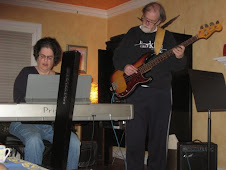There were press releases galore from my google alert on Gleevec delivered to my inbox today. Novartis has completed a study that compares patients who took the drug for 1 year versus 3 years.....and this is the big news......the overall survival rate was also higher with 92 percent of those who got three years of Gleevec therapy still alive after five years compared with 81.7 percent for those who took the Novartis pill for one year.
After five years the numbers go down a little bit........In the 400-patient study, five-year recurrence-free survival was seen in 65.6 percent of those who received Gleevec for three years. That compared with 48 percent in the one-year group.
But hey-as my oncologist says-there are more drugs out there that I can take if my gene mutation/cancer cells become resistant to Gleevec.
The World Science Festival was in NYC this past week, and there was a discussion about cancer and sequencing genomes. From the NYTimes.....
Why try to sequence cancer genomes? Dr. Besser asked.
Dr. Lander said that cancer was caused by mutations and that it was “nuts” to think the disease could ever be cured without understanding what had gone wrong genetically. But the first step was to sequence the normal human genome; then, cancer genomes could be tackled. Cracking the normal genome cost a few billion dollars, but since then, he said, the cost of sequencing had dropped to $10,000 or less per genome, and so it made sense to apply the technology to cancer. Samples are needed from many patients with each type of cancer, he said. Sequencing a cancer from one person will reveal many mutations, but not all of them will be involved with the disease.
Genetic findings have also led to some very focused treatments for cancer: drugs like Herceptin, for women with a certain type of breast cancer, and Gleevec, which is used for some blood cancers and gastrointestinal stromal tumors with specific mutations.
I sent a sample of my tumor tissue for research and to figure out my "personal" gene mutation to Dr Chris Corless of the Oregon Science and Health University. He then puts that with all of the other samples that are being sent from around the world so that they can create a data base and study the gene mutations.
I am still on 400 mgs of Gleevec-which I take every night. I used to have most all of the side effects listed, but now it's just down to edema, muscle cramping (which can be very painful at times) and the occasional upset stomach. Chemo fog is still an issue, early morning and late at night. I take it before I go to bed so that the bulk of the metabolizing happens when I sleep, but that's also why early morning is difficult. if I took it during the day I would really be out of it. Lately I have found that drinking green tea really fires up my neuro transmitters-specifically "Yogi Green Tea Energy" which is a combination of green tea, spearmint, lemongrass and komucha. I combine it with organic black tea for a very delicious ice tea!
Overall, this is good news I'll take the 92% any day! I'm now starting year 3 as of 2 months ago, so who knows, maybe in another year they will have figured out why some people become resistant-that would be a blessing.





No comments:
Post a Comment